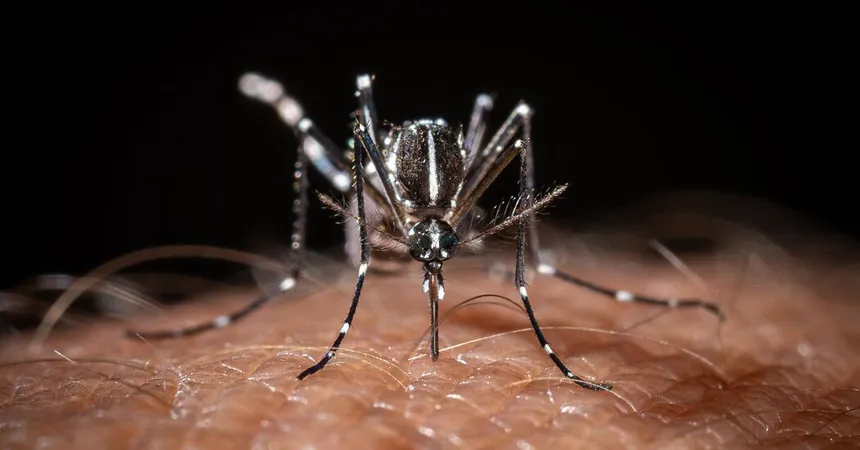
Alarming Rise of Rare Mosquito-Borne Illness: A Human Case Confirmed in New York State!
2024-09-21
Overview
In a concerning development, a patient in New York has been hospitalized due to Eastern Equine Encephalitis (EEE), a rare yet severe mosquito-borne illness. The case, confirmed by the state’s Health Department, is notably the first human infection reported in New York since 2015 and occurred in Ulster County, located approximately 100 miles north of New York City.
Health Alerts
This incident has raised alarms particularly because there is currently no vaccine or cure available for EEE. State health officials are advising residents to take proactive measures against mosquito bites, particularly as the summer mosquitos remain active. The Centers for Disease Control and Prevention (CDC) noted that this summer alone, six other states in the Northeast—including Massachusetts, Rhode Island, Vermont, New Hampshire, New Jersey, and even distant Wisconsin—have reported human cases of EEE, with New York's case marking a total of 10 nationwide by September 17.
Symptoms
While many who are bitten by EEE-infected mosquitoes may not exhibit symptoms, those who do often report severe reactions such as headaches, fever, chills, and vomiting. The horrific reality is that severe cases can result in seizures, comas, and even encephalitis, with an alarming one-third of cases proving fatal and over half leading to enduring neurological complications.
Expert Advice
“Even though temperatures are dropping, the risk of mosquito-borne illnesses is still very real. New Yorkers must remain vigilant,” said Dr. James McDonald, the state's health commissioner, urging residents to guard against bites by using repellents, covering skin with long sleeves and pants, and avoiding outdoor activities during dusk, peak hours for mosquito activity.
Mosquito Populations
Experts warn that mosquito populations may persist until conditions are cold enough to freeze standing water—breeding grounds for these pests—which typically does not happen until mid-October in many New York regions. The outbreak of EEE has already caused significant concern, pushing many individuals in high-risk areas to limit outdoor activities, especially after sunset when mosquitoes are most active.
Impact on Other States
Massachusetts, which has faced the brunt of this outbreak, reported four cases, while New Hampshire tragically noted a death linked to the virus.
Historical Context
EEE is endemic to North America, indicating its recurring presence across the continent. A significant outbreak occurred in 2019 when 38 cases and 12 deaths were recorded nationally—the highest number in over five decades—although none were in New York. Historically, New York has faced its own challenges with EEE; the last human cases occurred in 2015, resulting in two fatalities among three people infected.
Mortality Rates
The state health department has recorded a total of seven deaths linked to EEE in New York since 1971. It's important to note that EEE is transmitted only through the bites of infected mosquitoes; human-to-human transmission is not possible, nor can sick animals spread the virus.
Risk for Animals
Additionally, it is not only humans at risk. Horses are particularly vulnerable to EEE, with mortality rates as high as 90% after infection. This summer, several horses across the state have been reported infected, and two deaths were noted, including one incident in Ulster County.
Other Affected Species
Even more alarming, the virus has shown rare instances of affecting other animals, leading to the deaths of two emus in Rensselaer County just weeks ago.
Call for Vigilance
As mosquito-borne illnesses like EEE continue to emerge and spread across the United States, awareness and prevention are crucial. According to the CDC, as of mid-September, there have been 659 reported cases of the West Nile virus—more common but less fatal than EEE—reinforcing the vital need for public vigilance as mosquito activity is expected to linger until the onset of colder weather.
Conclusion
Stay safe, informed, and prepared as we approach the season's end—but know that the risk remains!




 Brasil (PT)
Brasil (PT)
 Canada (EN)
Canada (EN)
 Chile (ES)
Chile (ES)
 España (ES)
España (ES)
 France (FR)
France (FR)
 Hong Kong (EN)
Hong Kong (EN)
 Italia (IT)
Italia (IT)
 日本 (JA)
日本 (JA)
 Magyarország (HU)
Magyarország (HU)
 Norge (NO)
Norge (NO)
 Polska (PL)
Polska (PL)
 Schweiz (DE)
Schweiz (DE)
 Singapore (EN)
Singapore (EN)
 Sverige (SV)
Sverige (SV)
 Suomi (FI)
Suomi (FI)
 Türkiye (TR)
Türkiye (TR)